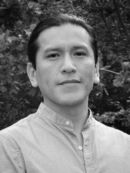Contact
Department of Social and Cultural Anthropology
Oettingenstr. 67
80538 Munich
Room:
U 112
Phone:
+49 (0) 89 / 2180 - 9643
Fax:
49 (0) 89 / 2180 - 9602
Email:
Ruben.Chambi@ethnologie.lmu.de
Work group
ERC-Projekt:
Indigeneities in the 21st century: From ‘vanishing people’ to global players in one generation
(ERC Starting Grant, Number 803302)
Principal Investigator: Prof. Dr. Philipp Schorch
Research interests/Area of responsibility
Reconstituting Suma Qamaña:
Economic practices and expressions of well-being among Aymara traders in the city of El Alto, Bolivia
Suma Qamaña is an Aymara concept that precedes and gives rise to "Vivir Bien", a category widely used as a philosophical contribution of Indigenous peoples in Latin America in politics and social sciences, based on principles such as complementarity with mother earth and community life. Since 2009, the Bolivian state has incorporated "Vivir Bien" into its public policies, presenting it as proof of its anti-capitalist position, as it is seen as the antithesis of Western culture and the market economy.
However, a historical look at Suma Qamaña shows a different intention in the ideas of its creators. Suma Qamaña was conceived by Aymara thinkers who, between the 1970s and 1980s, arrived from rural areas to settle in what would become the future city of El Alto. Influenced by global struggles for decolonisation, they created concepts and symbols that challenged the Bolivian state, which they considered colonial. Suma Qamaña, conceived under their own logics, was proposed as a perspective of well-being, a concept that would allow them to express their economic, social and political aspirations in the face of an exclusionary urban society.
Based on a historical and ethnographic study, this doctoral thesis aims to trace Suma Qamaña as an anti-colonial Aymara concept of the 1970s and 1980s (different from “Vivir Bien”) and to analyse in which ways this notion of well-being manifests itself among contemporary Aymara traders in El Alto. In recent years, this group has become a prolific sector in terms of social, economic and political positioning, giving way to novel expressions that reconfigure the urban. The aim is to delve into the logics of contemporary Aymara well-being, its transitions and projections and, in this process, to discover perspectives that go beyond the official discourses that present these people as communitarian and anti-mercantile societies.
Academic Career
Ruben Dario Chambi studied Anthropology at the Universidad Mayor de San Andrés (UMSA), Bolivia, and holds a master’s degree in Human Rights, Democracy and Globalisation from the Universidad Oberta de Catalunya (UOC). Since 2006, he has worked as a project manager, consultant, trainer, and researcher in various academic and development organizations in Bolivia. He is the author of several publications on issues related to autonomy and Indigenous rights, decolonization, “Buen Vivir” (Living Well) and child labour. His current project is focused on the processes of modernity, identity, coloniality and reflection on categories such as “Buen Vivir” among the Aymara communities.
Publications
List of Publications (519 KB)
Downloads
- CV Ruben Chambi (469 KByte)


